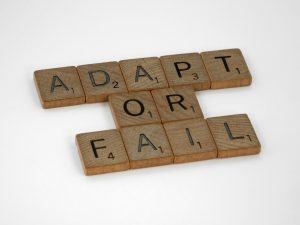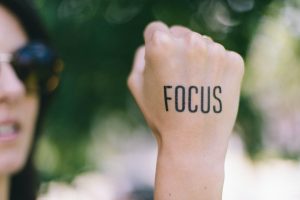Living with ADHD can be an exhausting and, at times, emotional experience. Sometimes we become so stressed in social and professional situations that we end up exhibiting the worst traits of ADHD. However, we are not without hope, because we can adapt our behavior, though it might take practice, time, and patience. Let’s consider what adapted ADHD behavior looks like and contrast it to when we are distressed and under pressure.
Understanding ADHD
ADHD is classified as a neurodevelopmental disorder, which means that our brains are inhibited as far as certain behavior is concerned. We might struggle to organize our thoughts, remember certain details, control our emotions, stay focused on one thing, or prioritize our time between tasks.
When we don’t understand the disorder, we will often compare our faults with other people who don’t struggle in the same ways. We end up feeling bad about ourselves for these failings.
 ADHD is not curable, but it is manageable through a combination of medication, cognitive behavioral therapy, ADHD coaching, and some personal disciplines. We can learn to become more organized and focused while working on our social skills and identifying the things that trigger our hyperactivity. Getting our diet, physical health, and sleep schedule in order will also greatly impact our ability to manage the undesirable symptoms of ADHD.
ADHD is not curable, but it is manageable through a combination of medication, cognitive behavioral therapy, ADHD coaching, and some personal disciplines. We can learn to become more organized and focused while working on our social skills and identifying the things that trigger our hyperactivity. Getting our diet, physical health, and sleep schedule in order will also greatly impact our ability to manage the undesirable symptoms of ADHD.
Distressed Versus Adapted ADHD Behavior
Whether we opt for medication, self-help, professional therapy, or a combination of these, we will find a sense of control and confidence in places that once left us feeling frustrated and defeated. Sometimes it is encouragement enough to know what we look like under pressure as opposed to what our behavior could look like when we have gained control of things. This is a comparison of distressed ADHD behavior versus adapted ADHD behavior.
Distressed: Sensitive to Rejection, Low Self-Esteem
 Sometimes we are all too aware of how we struggle to fit in. We anticipate rejection, even when people have not rejected us. This affects our self-esteem. We often withdraw from stressful situations rather than face failure or possible rejection. This affects friendships, relationships, and even our professional performance.
Sometimes we are all too aware of how we struggle to fit in. We anticipate rejection, even when people have not rejected us. This affects our self-esteem. We often withdraw from stressful situations rather than face failure or possible rejection. This affects friendships, relationships, and even our professional performance.
Adapted: Thoughtful, Outward-Focused
One of the most helpful things that can happen when we learn to adapt our behavior is that we spend less time thinking of ourselves and our struggles. This gives us the space to focus on others. This can be like a weight off our shoulders. We no longer have to guard ourselves or withdraw from stressful situations. Rather, we can dedicate ourselves to friendships, relationships, and work projects.
Distressed: Short-tempered, Blames Others
We can be pretty grouchy sometimes. That’s not an excuse – it’s just a fact of having ADHD. When we become overwhelmed and stressed out, we can’t soften our responses or practice patience and understanding. It’s a bit like weightlifting, though; no one can easily lift a heavy weight on their first try. It takes practice not to give in to our instincts and knee-jerk responses.
Adapted: Considers the Situation, Strong Moral Compass, Dedicated to the Long Haul
People with ADHD can be some of the most dedicated people and the hardest workers. When we learn to stop and consider things to contain our frustration (or channel it elsewhere), we are less likely to abandon the situation out of frustration. In turn, this gives us the chance to tap into our natural endurance and to use that strong moral compass most of us possess innately. Friends, partners, and work colleagues will thank us for devoting our time to working on ourselves.
Distressed: Impulsive, Confrontational, Prone to Drama
Whether we are causing it or simply experiencing it, many people with ADHD know about drama. Situations tend to escalate when a stressed person with ADHD is around because we can struggle to let the little things go. When under stress, we tend to make impulsive decisions and confront anyone who doesn’t agree with us. This can make for highly charged situations. Even when we are conflict-avoidant, we might find ourselves surrounded by drama often.
Adapted: Calm in Stressful Situations, Takes Control
 When you begin to peel back the layers of our emotional responses toward highly charged situations, you realize that most of the drama is caused by us trying to gain control of the situation.
When you begin to peel back the layers of our emotional responses toward highly charged situations, you realize that most of the drama is caused by us trying to gain control of the situation.
When we learn to think and assess the situation before reacting to it, we will often see the solution before others. One of the benefits of a brain with ADHD is that we can remain calm under pressure and see solutions to complicated problems. We just need to learn to step around the drama and tap into that ability.
Distressed: Withdrawn, Closed Off
Much like when a turtle senses danger and protects itself by withdrawing into its shell, we tend to shut ourselves away from the world when we are stressed and uncertain. Whether we seek comfort in our own physical space at home or we just spend time alone, we are relieved when we do not have to meet the demands of the “real world” when stressed. This is healthy to do from time to time, but it is harmful if it becomes a habit.
Adapted: Creative, Thinks Outside the Box
While ADHD often poses a problem for us, it also provides us with unique insight that comes from the way we think. We withhold our creative perspective when we withdraw and don’t contribute to situations. People with ADHD tend to be lateral thinkers; we see the alternate side to situations. This can be invaluable on a work project or simply in a friendly, low-stakes conversation.
Distressed: Fails to Prioritize, Easily Overwhelmed, and Frustrated
Among the biggest battles we face is our failure to prioritize. Our brains work a mile a minute. We derive enjoyment from hopping from task to task, but not focusing too deeply on anything. This has negative consequences, as most of life, whether social or professional, requires some focus and discipline.
Adapted: Analytical, Hyper-focused, Foresight
 The other side of the ADHD coin is that we can hyperfocus. This means that when we get started on a task that demands attention and we lock in, we will not finish until it’s done. With this skill comes an ability to see “the big picture” of an issue and to problem-solve any potential flaws in the plan. Needless to say, these are fantastic professional skills to have, but they are helpful in social situations too.
The other side of the ADHD coin is that we can hyperfocus. This means that when we get started on a task that demands attention and we lock in, we will not finish until it’s done. With this skill comes an ability to see “the big picture” of an issue and to problem-solve any potential flaws in the plan. Needless to say, these are fantastic professional skills to have, but they are helpful in social situations too.
Distressed: Self-destructive, Irresponsible
One of the reasons we indulge in self-destructive behavior is that it feels like we have control over a situation by making choices that change the narrative. However, we usually come to regret a lot of the spontaneous, harmful decisions we make after the fact. It might take a few chances for us to learn not to give in to certain urges when we get stressed.
Adapted: Energetic, Spontaneous, Fun
When we are in a good space emotionally, those of us with ADHD are a lot of fun to be around. We bring enthusiasm to any place we are in. Our preference for dynamic, spontaneous plans means that people will not be bored in our presence. Our tendency to be high-energy and excitable might not be everyone’s preference, but most of us are used to being the one who brings fun and life to any situation.
Next Steps for Adapted ADHD
If you would like some support in dealing with ADHD, it might be a good idea to talk with a counselor. Counselors can provide you with a safe space to vent about your struggles. They are also a reliable place to learn more about ADHD, support groups, and ADHD trainers. If this is something that interests you, reach out to our offices today for more information.
Photos:
“Adapt or Fail”, Courtesy of Brett Jordan, Unsplash.com, CC0 License; “Stressed”, Courtesy of Uday Mittal, Unsplash.com, CC0 License; “Drowning”, Courtesy of Ian Espinosa, Unsplash.com, CC0 License; “Focus”, Courtesy of Chase Clark, Unsplash.com, CC0 License
-
Jane Zerabruk: Author
As your counselor, I will share professional and personal therapeutic strategies that will help you live a more balanced, connected, and joy-filled life in Christ. I offer counseling for children, teens, adult individuals, and families. Whether you’r...
-
Kate Motaung: Curator
Kate Motaung is the Senior Writer, Editor, and Content Manager for a multi-state company. She is the author of several books including Letters to Grief, 101 Prayers for Comfort in Difficult Times, and A Place to Land: A Story of Longing and Belonging...
DISCLAIMER: THIS ARTICLE DOES NOT PROVIDE MEDICAL ADVICE
Articles are intended for informational purposes only and do not constitute medical advice; the content is not intended to be a substitute for professional medical advice, diagnosis, or treatment. All opinions expressed by authors and quoted sources are their own and do not necessarily reflect the opinions of the editors, publishers or editorial boards of Stone Oak Christian Counseling. This website does not recommend or endorse any specific tests, physicians, products, procedures, opinions, or other information that may be mentioned on the Site. Reliance on any information provided by this website is solely at your own risk.







